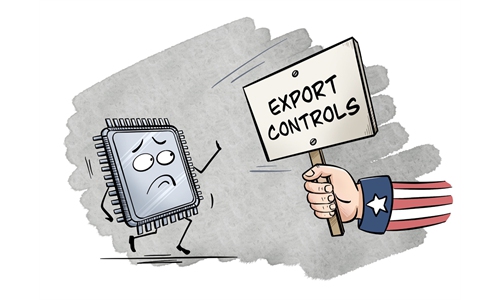
Illustration: Xia Qing/GT
Against the backdrop of a global boom in demand for artificial intelligence (AI) semiconductors, Samsung Electronics' fast-growing yet lower-than-expected operating profit for the third quarter offers a window into the practical significance of China-South Korea chip industry chain cooperation.Samsung Electronics estimated on Tuesday an operating profit of 9.1 trillion won ($6.78 billion) for the three months ending September 30, marking a 274 percent surge from a year earlier. However, this figure fell short of analysts' expectations, according to media reports.
Samsung Electronics' operating profit generated renewed attention and discussion about memory chips. Samsung Electronics did not break down its earnings by business divisions, but experts said that its lower-than-expected earnings were attributable to sluggish shipments of memory chips due to contracting sales of smartphones and personal computers, the Yonhap News Agency reported on Tuesday.
The results came amid the explosive growth of generative AI tools. It is undeniable that the breakthrough of generative AI has been a boom for the semiconductor industry. The surge in interest and use of generative AI have translated into higher demand for high-performance, high-precision AI semiconductors, pushing the industry to continue innovating.
However, while demand for advanced AI chips is skyrocketing, commodity chips used in electronic products such as PCs and smartphones still hold a considerable market share, making their production and sales crucial for semiconductor manufacturers.
As the restructuring of the global semiconductor industry chain seems to have accelerated, the intrinsic complementarity between China and South Korea in the field of commodity chips has become more prominent.
If well utilized, this complementarity could help South Korean chipmakers enhance the performance and profitability of their commodity chip business.
First, China's domestic semiconductor market is massive. Although analysts cited by media reports indicate that global demand remains lackluster for commodity chips, the Chinese market offers tremendous opportunities for global semiconductor manufacturers, including South Korean companies.
According to the General Administration of Customs of China, China's integrated circuit imports rose by 11.5 percent year-on-year in US dollar terms in the first eight months of this year, while the total import volume increased by 14.8 percent.
As global demand stutters, the Chinese market is becoming increasingly important for global semiconductor manufacturers.
Second, South Korean chipmakers can reduce costs by continuing to produce semiconductors in China and expanding their production capacity. China is not only an important sales market but also a crucial production base for South Korean chip enterprises. Recent decades have seen South Korea-based semiconductor manufacturers, including Samsung, producing large quantities of memory chips in their plants in China.
China has long been one of the world's largest chip producers. Chips made in the country are often considered more affordable compared with those produced in some developed economies.
China's well-established industrial chain has helped semiconductor manufacturers achieve the dual goals of cutting production costs and improving product quality through a mature supply chain, smooth logistics and skilled workers.
Although South Korean chipmakers have technical advantages in memory chips over competitors in other countries, the gaps are narrowing. In the foreseeable future, as technology continues to mature, overall market competition will probably intensify due to diversifying consumer needs and increasing price competition.
It is not surprising that some South Korean chipmakers have felt competitive pressure from Chinese enterprises. If they view China's price advantage not from a competitive perspective but from a cooperative perspective, and take full advantage of China's industrial chain to expand production capacity in the country, they can enjoy the price dividends of made-in-China semiconductors.
The scale of trade and investment cooperation between China and South Korea is substantial, with strong complementarity, and there remains significant potential to be tapped.
The author is a reporter with the Global Times. bizopinion@globaltimes.com.cn



